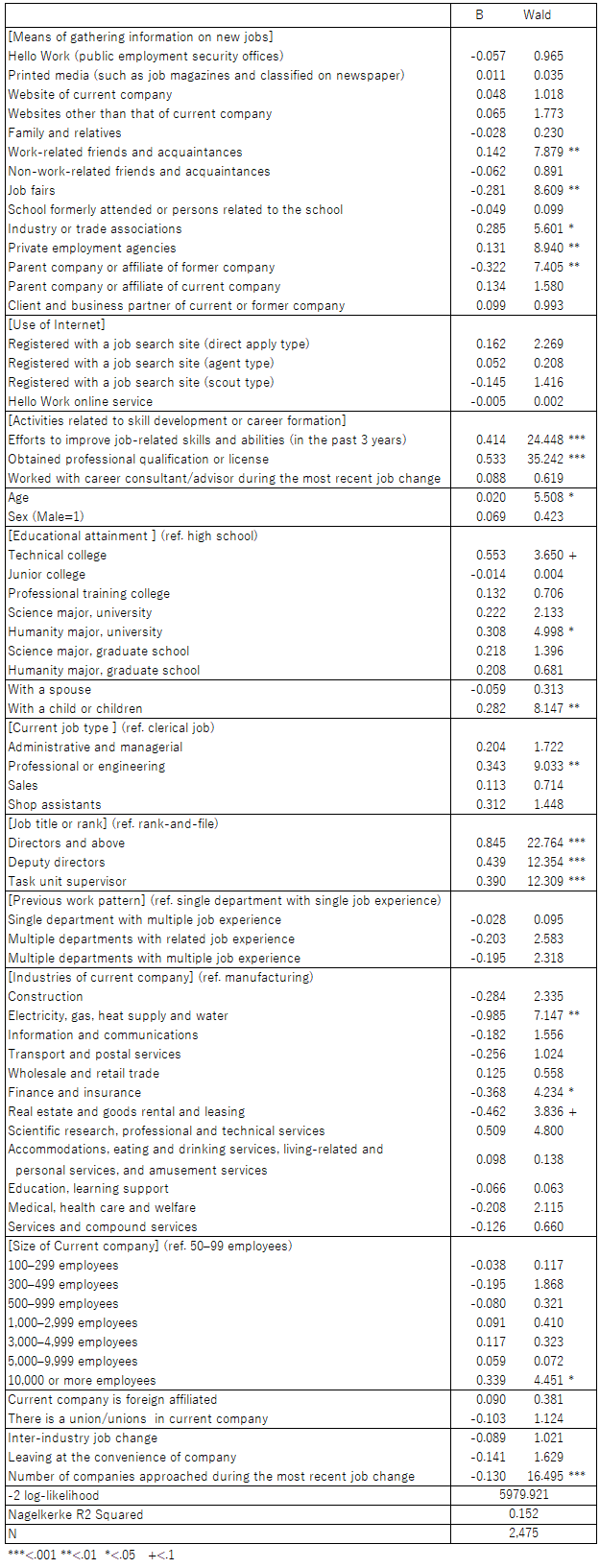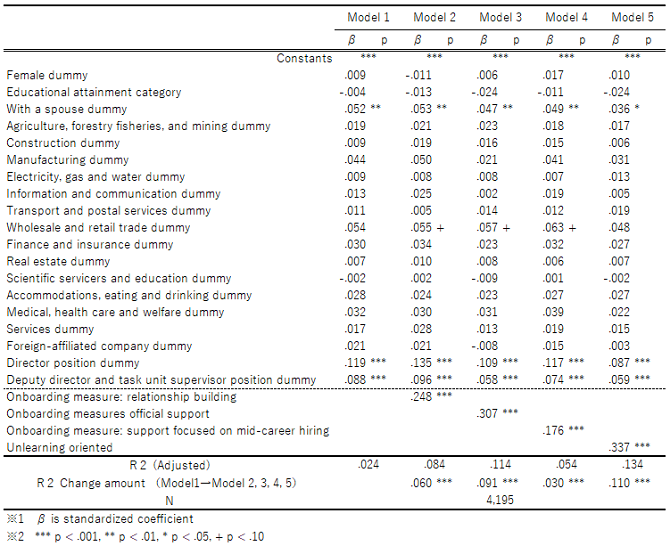JILPT Research Report No.215
Job Change, Skill Development, and Career Formation of Middle-Aged Workers
March 31, 2022
Summary
Research Objective
In the government’s 2019 Basic Policies for Economic and Fiscal Management and Reform (“Big-Boned Policy”), the promotion of mid-career hiring of experienced workers was stated as part of the Reform to a Social Security System Oriented to All Generations. In fact, the number of full-time workers who changed jobs is on the rise. More of them are changing jobs to larger companies. In Japan, full-time workers in the middle age has been generally considered as established compared to the younger and senior age groups, but now they are increasingly changing jobs.
The increase of middle-aged workers’ job change may indicate that the structure and targets of long-term, stable employment in Japanese companies are gradually changing. It is necessary for us to understand the actual situation in order to look ahead to the future employment system and promote mid-career hiring as the “Big-Boned Policy” insists. In this study, we set an analytical task, keeping in mind to the trend of job change especially among middle-aged workers as well as the previous studies on job changes in Japan, and reanalyze data of the “Survey on Job Change, Skill Development, and Career Formation of Middle-Aged Workers” conducted in December 2020 by the Japan Institute for Labour Policy and Training (JILPT).
Research Method
Re-analysis of surveys
Key Findings
- The analysis of job change activities and skill development/career formation activities in relation with job change outcomes (such as wages, position, and utilization of skills and knowledge after job change) showed that the likelihood of raising one's position level significantly increased with a higher frequency of contact with "work-related friends and acquaintances" when seeking to change jobs. In addition, a higher frequency of contact with "work-related friends and acquaintances" during the job change activities was also found to be associated with a higher utilization of skills and knowledge after job change (Figure 1).
- Possession of a professional qualification or license was observed to have a statistically significant positive correlation or a trend toward a positive correlation with any of the results such as better wages, a higher job position, and the more effective use of skills and knowledge after job change. Also, efforts to improve job-related skills and abilities in the past three years were associated with higher ratings from job seekers themselves regarding the use of skills and knowledge after job change (Figure 1).
- An analysis of how new employer takes measures to encourage new employee’s adjustment to the organization and how new employee attempts to adjust new workplace showed that (1) new employees who received "onboarding measures" implemented by the employer for new employees’ adjustment had better outcomes in employees’ organizational socialization as well as attachment to organization and willingness to stay with the company, and (2) those with a stronger unlearning orientation (having a positive attitude toward new environment and change) showed higher socialization outcomes as well as more attachment and retention to the company (Figure 2).
- An analysis of middle-aged workers who changed jobs with relocation reveals that (1) the percentage of females following such a pattern was about half that of those females without relocation, (2) those who made a decision to move to the Tokyo metropolitan area from other prefectures for a job change (the jyokyo type job change) may particularly have practiced such a transition in search of an environment where they could develop their careers, and (3) those who once worked in the Tokyo Metropolitan area and made a decision to move back to their hometowns or to other places in the suburb for a job change (generally called in Japanese the “U-turn” and “J-turn” type job change, respectively) or once worked in the Tokyo Metropolitan area and choose a job in the suburb other than their hometowns (the “I-turn” type job change) were found to be relatively older, seeking new opportunities such as transitioning to management positions at small and medium-sized companies operating in regional areas.
- A comparative analysis between job changers and long-time employees shows that the former have a higher level of work engagement on average, higher self-evaluations of work performance, and a stronger tendency to have an "autonomous career perspective," that is, a sense that they are responsible for their own career decisions or that they find a meaning of work in being boundaryless from the organizational structure.
Figure 1. Relationship between the degree of skills and knowledge utilization at a new job and activities taken in advance for job change and skill development or career formation (ordinal logistic regression analysis)

Source: JILPT Research Report no.215 (p.52).
Figure 2. Results of multiple regression analysis with the outcome of organizational socialization as the dependent variable

Source: JILPT Research Report no.215 (p.52).
Policy Implications
- A higher frequency of contact with "work-related friends and acquaintances" for job change is associated with a higher likelihood of a rise in position and in the utilization level of skills and experience in the new job. Developing job-change environment and systems across companies and industries as well as professionals in the same occupations and promoting companies’ use of connections with "work-related friends and acquaintances" (such as the “referral recruitment”) would consequently contribute to facilitating job change in the middle age and utilizing their experiences and career.
- Efforts to improve skills and abilities play a major role in helping job changers realize the usefulness of the skills and experience they have developed. Social and political support is required to help workers who are considering changing jobs or who have changed jobs implement skills development at the timing they deem effective.
- Possession of professional qualifications or licenses is more likely to be associated with better wages, higher position levels, and greater use of skills and knowledge. Based on the results of this analysis, it would be effective to create a database of job openings gathered at Hello Work (public employment security offices) or private job placement agencies, for example, that would identify the most in-demand professional qualifications or licenses for each type of industry and occupation to support middle-aged workers in their job search.
- The analysis of how employee’s motivation and commitment to the organization are related with the receiving company’s efforts to promote them suggests the need to raise awareness of onboarding policies, of which importance is not yet sufficiently shared among Japanese companies. Once such awareness is further enhanced, it may be necessary to consider policy support for companies to introduce the system.
Research Period
2017–2021
Authors
- FUJIMOTO Makoto
- Senior Researcher, JILPT
- TANAKA Hideki
- Associate Professor, Faculty of Policy Studies, Doshisha University
- KIYOHARA Yuu
- Part-time Lecturer, Faculty of Tourism, Rikkyo University
Contents
JILPT Research Report No.215, full text (PDF:2.7MB) [in Japanese]
Category
Related Research
- JILPT Research Reports No.175, Tenshoku shijo ni okeru jinnzai bijinesu no tennkai [The Development of Human Resources Business in the Career-Change] (2015).
- Research Series No.149, Chukonenreisha no tenshoku / saishushoku chosa [Survey of Job Change and Reemployment among Middle-Aged and Older People] (2016).
- Research Material Series No.168, Makuro no rodo ido, tenshoku shijo no jittai: Kizon tokei to hiaringu chosa yori [The Current State of Labor Mobility and the Job Change Market on a Macro Level: Insights from Existing Statistics and an Interview Survey] (2016).
- Research Series No.215, Midoru eiji so no tenshoku to noryoku kaihatsu / kyaria keisei: tenshokusha anketeto chosa kekka [Job Change, Skill Development, and Career Formation of Middle-Aged Workers: Results of a Questionnaire Survey] (2021).
- Research Material Series No.252, Midoru eiji so no tenshoku to noryoku kaihatsu / kyaria keisei: tenshokusha anketeto chosa kekka [Job Change, Skill Development, and Career Formation of Middle-Aged Workers: Records of an Interview Survey with Those Involved in Job Change of Middle-Aged Workers] (2022).
- Discussion Paper 22-05, Tenshoku kodo no danjo sa: Tenshoku zengo no tasuku kyori to chingin henka ni chakumoku shite [Differences of Job Search Activity by Gender: Focusing on Task Distance and Wage Changes Before and After Job Changes] (2022).
JILPT Research Report at a Glance
| To view PDF files, you will need Adobe Acrobat Reader Software installed on your computer.The Adobe Acrobat Reader can be downloaded from this banner. |

